Lawrence Nault's Blog, page 2
June 25, 2025
Fragments of Frost and Fire - Episode 8 - The Narrow Path
There are moments in life when the choices before us aren’t clear-cut—when we’re not deciding between right and wrong, but between two difficult, uncertain paths. Some are quiet, personal crossroads: whether to stay or leave, speak or stay silent, act or wait. Others are much larger, woven into the world’s violence and velocity—choices that ask who we are, and who we’re willing to become.
The Narrow Path is a poem about those in-between places. It's about walking the line between action and retreat, resistance and resignation. It's about the tension we live with—individually and collectively—as the world asks more of us than certainty can offer.
This piece doesn't aim to provide answers. Only to hold space for the questions, and the weight of walking.
The Narrow Path Photo by Rachel Claire: https://www.pexels.com/photo/narrow-r...
Photo by Rachel Claire: https://www.pexels.com/photo/narrow-r...We walk the line where shadow slips beneath the trees,not night, not day—but the hush between.Not the storm,not the calm—but the wind just before it breaks.We stayedwhen the house no longer echoed us.Not love, not hate,but something worn and weatheredbetween.We left the job with steady pay,not chasing dreams,not fleeing dread—just needing air.We watched a friend unraveland wondered if our voicewould heal or haunt.Not savior, not ghost—just the ache of not knowing.We saw a man taken from the streetby men in unmarked black,no words spoken—just vanishing.We posted, we shouted,but did not follow.Not cowards, not heroes—just shaking and still.We read of families burned from their homes,children disappeared,names erased from maps and memory.The word was genocide.We whispered it—too late.Not ignorance, not denial—just the comfort of elsewhere.We stood in heat that broke the sky,watched fires turn forests into smoke.Knew the air was wrong,the season warped.Still we bought, still we burned.Not helpless, not free—just tangled in the thrum of now.We watched flags wave like weapons,truth traded for spectacle.Watched neighbors become enemiesbecause it was easier than listening.Not righteous, not rebel—just tired, and temptedto shut the door.We held the penand asked it to tell the truth.But truth splits like shale.Not lie, not fact—but fractured lineswe choose to follow or ignore.We stared into the machinethat offered us a thousand handsto do our work.Not theft, not craft—just mirrors in the fog,and no clear self to hold.
Still we walk—
not forward, not back,
but balanced
on the knife-edge of choice.
The path is narrow,edges jagged and steep.One missed stepand you fall into the maw of conflict,or into the exile of retreat.Each step a choice—between stillness and slipping,between breathand the breaking of it.And somewhere far—beyond the reach of decision—a bird riseson the edge of the wind,not flying away,not circling back,but heldexactlyin the tension.Support Independent Content Creation
I know, I know, I know...
These donation messages can be intrusive. I understand that. (Trust me, I feel awkward writing them too!)
But reaching out like this is crucial. Being reader-funded gives my work something valuable that many content creators don't have: true independence.
1. Your support means I can write about what matters. I'm not chasing sponsorships or compromising my voice to please advertisers. I can pursue stories and topics I believe are important, creative, and thoughtful, regardless of their commercial appeal.
2. Your support means I don't have to chase viral trends. Instead of engineering clickbait or jumping on every passing bandwagon, I can focus on creating thoughtful content that genuinely adds value to your life.
3. Your support means this content remains freely accessible. My work stays available to everyone, including those who can't afford to contribute financially right now. Quality independent content should be accessible to all.
I understand not everyone is in a position to contribute, but if you found any value in this post you can
For the price of a coffee, you'll enable me to invest more time in creating in-depth, creative journal posts and episodes of the Stone & Signal podcast. If you'd like to contribute more, consider purchasing one of my e-books (priced at roughly two cups of coffee) – a way to support my work while gaining additional value for yourself.
Thank you for considering. Your support makes all the difference.
June 24, 2025
Fragments Of Frost And Fire - Episode 7 - The Home That Wasn't
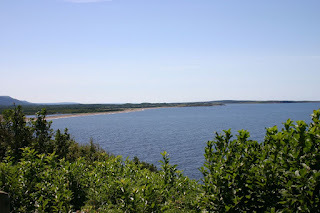 Derek Hatfield, CC BY 2.0 <https://creativecommons.org/licenses/..., via Wikimedia Commons
Derek Hatfield, CC BY 2.0 <https://creativecommons.org/licenses/..., via Wikimedia CommonsI’ve seen it in all her moods—spring rising shy and soft,fog lifting like a veil from the hills.Summer thick with salt and sunburn,kids leaping from docks,the echo of laughter carryingfarther than it should.But it was autumn that claimed me.A blaze of fire in the trees,like the whole island had set itself alightjust to say: look what you could belong to— if only you’d stay. Even winter felt less cruel there.Snow drifted slow as thought,and the cold didn’t biteso much as inviteyou inward—to stew pots, old tunes,the hush of a worldthat doesn’t beg to be conquered.Every visit, I thought—maybe next time,maybe I'll plant something herebesides footsteps.Maybe I’ll let these shoresclaim me proper.But the years came fast,and the rest of my lifestayed tethered elsewhere—to jobs,to promises,to people who never heardthe lilt in the windthat I did.Now, I know—I’ll never live there.Never see the leaves turnfrom the same porchyear after year.Never watch the ice creep inand think, this is mine to wait out.Still, when I dream,it’s of spruce shadows,and gulls wheeling abovea quiet that forgives mefor never belonging.Maybethat’s what made it homeall along—not the claim I made on it,but how gentlyit never asked.
Support Independent Content Creation
I know, I know, I know...
These donation messages can be intrusive. I understand that. (Trust me, I feel awkward writing them too!)
But reaching out like this is crucial. Being reader-funded gives my work something valuable that many content creators don't have: true independence.
1. Your support means I can write about what matters. I'm not chasing sponsorships or compromising my voice to please advertisers. I can pursue stories and topics I believe are important, creative, and thoughtful, regardless of their commercial appeal.
2. Your support means I don't have to chase viral trends. Instead of engineering clickbait or jumping on every passing bandwagon, I can focus on creating thoughtful content that genuinely adds value to your life.
3. Your support means this content remains freely accessible. My work stays available to everyone, including those who can't afford to contribute financially right now. Quality independent content should be accessible to all.
I understand not everyone is in a position to contribute, but if you found any value in this post you can
For the price of a coffee, you'll enable me to invest more time in creating in-depth, creative journal posts and episodes of the Stone & Signal podcast. If you'd like to contribute more, consider purchasing one of my e-books (priced at roughly two cups of coffee) – a way to support my work while gaining additional value for yourself.
Thank you for considering. Your support makes all the difference.
June 17, 2025
Indie Thread: A Proposal for a New CBC Program Celebrating Canadian Indie Creators
For decades, CBC has been a powerful champion of Canadian culture. From spotlighting homegrown musicians to amplifying the voices of independent filmmakers, it has helped carve out space for creators who might otherwise go unheard. But there’s one group that consistently slips through the cracks: Canadian indie authors.
I believe there’s an opportunity to change that—and to do something even more ambitious in the process.
This is my proposal for a new CBC radio program and podcast: Indie Thread.
 Photo by Pixabay: https://www.pexels.com/photo/two-gray... Is Indie Thread?
Photo by Pixabay: https://www.pexels.com/photo/two-gray... Is Indie Thread?Indie Thread is a cross-medium cultural program that weaves together Canadian indie voices from film, music, and literature. Each episode explores a central theme—grief, rebellion, belonging, water, silence—through three distinct lenses:
an independent filmmaker an independent musician an independent authorTogether, their stories create a layered, resonant portrait of that theme as it moves through different creative forms.
The result? A dynamic, exploratory listening experience that champions the full spectrum of Canadian indie art.
Why Now?Canadian indie creators are making some of the most urgent, beautiful, and boundary-pushing work in the country. But they often work in silos, separated by industry-specific platforms and algorithms that reward sameness over depth.
At the same time, readers—especially those who seek out independent voices—rarely hear authors featured alongside musicians or filmmakers. And self-published or small-press authors are still too often dismissed as “not quite real” in the eyes of cultural gatekeepers.
CBC has the reach and reputation to shift that narrative. Indie Thread is a chance to:
elevate indie authors alongside their film and music counterparts connect audiences across disciplines spark new cultural conversations rooted in Canadian storiesThe FormatEach 30–45 minute episode would be structured around a single theme. It would include:
Opening Reflections — The host introduces the theme and why it matters now. Segment 1: Indie Film — Interview with a Canadian indie filmmaker. Short clips or sound design elements bring their work to life. Segment 2: Indie Music — A conversation with a musician, woven with excerpts from their music. Segment 3: Indie Book — Spotlight on an indie author, including a brief reading or dramatized passage. Closing Threads — The host draws out connections, contrasts, and questions raised by the three voices.Bonus: select episodes could feature collaborative cross-medium segments or include listener-submitted mini-creations.
Who It’s ForIndie Thread would speak to:
CBC listeners with a love for arts and ideas fans of indie film, CanLit, live music, and small-press publishing emerging creators seeking community and inspiration anyone curious about the stories shaping this country from the ground upIt would especially resonate with listeners between 20 and 55 who are hungry for authentic, layered storytelling across platforms.
Format: Audio program (CBC Radio + podcast)
Length: 30–45 minutes per episode
Frequency: Weekly or biweekly
Season Length: 8–10 episodes
Host: Ideally a Canadian cultural critic, author, or artist who moves fluidly between disciplines. (Pick me!)
Produced by: Details, details, details… but the spirit is indie, collaborative, and deeply rooted in Canadian storytelling. Think flexible partnerships—with CBC, arts festivals, small presses, or wherever the good creative energy lives.
Let’s TalkThis is a program I’d love to help build. I already have a shortlist of compelling themes and creators from across the country who would make for powerful inaugural guests. Whether as a pilot, a limited-run season, or a long-term offering, Indie Thread offers a way for CBC to deepen its commitment to independent Canadian voices—across forms, regions, and generations.
If this sparks something in you, I’d love to talk more.
To readers of this blog: feel free to share this proposal or reach out if you’d like to be involved. Indie art thrives in community. Maybe this is one more thread we can weave together.
Fragments of Frost and Fire - Episode 6 - UNCLOUDED
The world around me shapes my words and thoughts.
Today, it was the story of a young woman—the valedictorian of an Ottawa high school—being punished for speaking out about the evils of this world. The same education system that taught her to think critically, to speak with conviction, is now trying to silence her.UncloudedThey say the young don’t see the worldfor what it truly is—but maybe they see it better.Not yet blinkered bythe cataracts of life:compromise, comfort,the slow erosion of outrageby daily breadand discounted dreams.They see with eyesnot fogged by history,not dimmed bythe weary mathof what will sell,what will pass,what won’t rock the boattoo much.We sit idle in the couch cushionswe’ve moulded to our shape,not noticing how longwe’ve sunk there,how the springs gave outyears ago.But the young rise,
refusing to settle long enough
to shape the world to their laurels,
choosing instead to push against walls,
and break down barriers.
They rise,and their voices cut through the hush—sharp, unwavering,not yet trimmedto fit insidewhat we call acceptable.A young womanat a microphone,naming genocidein her valedictory breath—truth ringing louderthan the applause.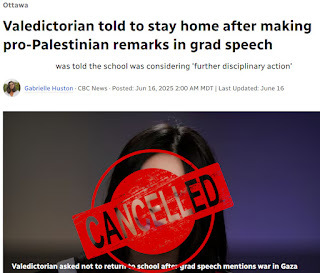
They rise,and the world stirs:from courtroom stepsto climate marches,from drowned coaststo burning hills,they walk out of our silenceand into the storm.The next generationof warriors—not armed with cynicism,but clarity—released like arrowsinto a skywe thought too heavy to pierce.
And we call themidealists,as if that werea sin.But maybe—just maybe—they are the oneswho see clearly,because they haven’t yetlearned to look away.
Support Independent Content Creation
I know, I know, I know...
These donation messages can be intrusive. I understand that. (Trust me, I feel awkward writing them too!)
But reaching out like this is crucial. Being reader-funded gives my work something valuable that many content creators don't have: true independence.
1. Your support means I can write about what matters. I'm not chasing sponsorships or compromising my voice to please advertisers. I can pursue stories and topics I believe are important, creative, and thoughtful, regardless of their commercial appeal.
2. Your support means I don't have to chase viral trends. Instead of engineering clickbait or jumping on every passing bandwagon, I can focus on creating thoughtful content that genuinely adds value to your life.
3. Your support means this content remains freely accessible. My work stays available to everyone, including those who can't afford to contribute financially right now. Quality independent content should be accessible to all.
I understand not everyone is in a position to contribute, but if you found any value in this post you can
For the price of a coffee, you'll enable me to invest more time in creating in-depth, creative journal posts and episodes of the Stone & Signal podcast. If you'd like to contribute more, consider purchasing one of my e-books (priced at roughly two cups of coffee) – a way to support my work while gaining additional value for yourself.
Thank you for considering. Your support makes all the difference.
June 16, 2025
Fragments of Frost And Fire -Episode 5- WALKING THE EDGE OF SILENCE
Walking the Edge Of Silence
He walksthe edge of things,
not for thrill,
but because the center holds no welcome.

What was once a life
now drags like loose thread—
unraveling in silence,
no protest,
no plea.
Friends became ghosts
long before they left.
Family: a word
too large for the absence it holds.
He stopped trying to explain.
They stopped trying to care.
But the dogs—
two tired shadows at his feet—
still follow him through wind and winter.
They ask nothing.
They know everything.
Their breath keeps time
with the broken metronome of his heart.
He tells himself
he stays for them,
and it’s true.
He could not bear to vanish
while their eyes still search the door,
while their paws still trust the earth
to bring him back.
To leave them—
is to sentence the loyal
to bewilderment and slow hunger.
It would mark his soul
with a wound that no grave could close.
He would carry their pain
through whatever came next.
And he will not do that to them.
And the stories—
the ones that ache behind his ribs,
the ones that come in fragments,
half-formed,
sacred—
if he leaves before they’re set down,
if he lets them scatter
as dust on the wind,
they will not forgive him.
They will burn.
Not into ash,
but into him.
He will carry their fire
in his marrow,
an eternal blaze of almost-said
and never-told.
So he waits.
Not for redemption.
Not for rescue.
But for the right endings.
He will not go
while fur brushes his skin
and old eyes still seek his face.
He will not go
while words still pace the cage
of his chest.
But when the last paw stills,
and the final page is written—
when the dogs sleep,
and the stories find their names—
he will know.
And he will go,
not with rage,
not with sorrow,
but with the hush of one
who gave all he had
before the silence.
Support Independent Content CreationI know, I know, I know...
These donation messages can be intrusive. I understand that. (Trust me, I feel awkward writing them too!)
But reaching out like this is crucial. Being reader-funded gives my work something valuable that many content creators don't have: true independence.
1. Your support means I can write about what matters. I'm not chasing sponsorships or compromising my voice to please advertisers. I can pursue stories and topics I believe are important, creative, and thoughtful, regardless of their commercial appeal.
2. Your support means I don't have to chase viral trends. Instead of engineering clickbait or jumping on every passing bandwagon, I can focus on creating thoughtful content that genuinely adds value to your life.
3. Your support means this content remains freely accessible. My work stays available to everyone, including those who can't afford to contribute financially right now. Quality independent content should be accessible to all.
I understand not everyone is in a position to contribute, but if you found any value in this post you can
For the price of a coffee, you'll enable me to invest more time in creating in-depth, creative journal posts and episodes of the Stone & Signal podcast. If you'd like to contribute more, consider purchasing one of my e-books (priced at roughly two cups of coffee) – a way to support my work while gaining additional value for yourself.
Thank you for considering. Your support makes all the difference.
June 10, 2025
Fragments Of Frost And Fire - Episode 4 - STRINGS
We enter this world as fallen puppets,
limbs sprawled across the stage of existence—
no strings to lift us skyward,
no master's hand to guide our dance.

Born frail and feeble,
we draw strength from those around us,
grasping at invisible threads
that promise to pull us upright,
to steady us as we move through the world.
The first string to attach, for the fortunate,
anchors in the heart of a loving mother—
silver-spun and strong as steel.
It lifts our chin, straightens our spine,
teaches us what it means to stand.
Then comes family,
bound by blood or bond—
the strings longer, more flexible,
but still supportive.
Friendship’s golden wire finds hold next:
laughter’s crimson cord,
the emerald thread of first love
that makes us leap and spin.
We gather strings like promises,
each one a reason to rise—
mentors who guide our gestures,
passions that animate our purpose.
For a while, we dance beautifully,
suspended in a web of care.
Every movement graceful,
every step supported.
But time is the cruelest puppet master.
Strings once strung tight fall slack,
some intentionally severed.
We stumble—
waiting for loose threads to pull taut,
or for new ones to lift us once more.
One by one, the strings grow thin:
a father’s voice fades to silence,
childhood friends drift out of reach.
Some cords snap without warning—
the sudden loss that drops us to our knees,
forcing us to relearn how to move
with fewer strings.
Others, we cut ourselves,
tired of being pulled
in directions that no longer serve
the dance we want to perform.
Sometimes we try to repair a connection—
a knot in the string,
a new anchor point—
but these seldom hold fast.
And sometimes,
desperate for support,
we grasp at strangers’ strings:
borrowed threads that jerk us sideways,
make us stumble,
make us fall.
The art is learning which strings to keep,
which ones to mend when they fray,
how to stand with grace
even when half our supports are gone.
We become our own puppet masters,
holding some strings in our own hands,
dancing not because we must,
but because we choose to move.
Some exist without strings—
nothing attached to them.
You see them: feeble and broken,
unable to stand.
Or tall and rigid,
their inflexibility the price of standing,
leaving them unable to dance.
In the end, the wisest puppets know:
freedom isn’t having no strings—
it’s choosing which connections
deserve to lift us toward the light.
The Slow Bloom Of Ice
Wounds That Won't Heal Support Independent Content Creation
I know, I know, I know...
These donation messages can be intrusive. I understand that. (Trust me, I feel awkward writing them too!)
But reaching out like this is crucial. Being reader-funded gives my work something valuable that many content creators don't have: true independence.
1. Your support means I can write about what matters. I'm not chasing sponsorships or compromising my voice to please advertisers. I can pursue stories and topics I believe are important, creative, and thoughtful, regardless of their commercial appeal.
2. Your support means I don't have to chase viral trends. Instead of engineering clickbait or jumping on every passing bandwagon, I can focus on creating thoughtful content that genuinely adds value to your life.
3. Your support means this content remains freely accessible. My work stays available to everyone, including those who can't afford to contribute financially right now. Quality independent content should be accessible to all.
I understand not everyone is in a position to contribute, but if you found any value in this post you can
For the price of a coffee, you'll enable me to invest more time in creating in-depth, creative journal posts and episodes of the Stone & Signal podcast. If you'd like to contribute more, consider purchasing one of my e-books (priced at roughly two cups of coffee) – a way to support my work while gaining additional value for yourself.
Thank you for considering. Your support makes all the difference.
June 2, 2025
New YA Novel and Storytelling Video Illuminate Ocean Crisis Through the Eyes of Youth - Media Release
FOR IMMEDIATE RELEASE
June 8, 2025 – World Ocean Day
New YA Novel and Storytelling Video Illuminate Ocean CrisisThrough the Eyes of YouthAuthor Lawrence Nault Releases Fingerprints In The Waterwith a Special World Ocean Day FeatureOn World Ocean Day, author and filmmaker Lawrence Naultreleases Fingerprints In The Water, the third installment in the Draconimseries—an urgent novel about ocean pollution, ecological truth-telling,and the fierce clarity of youth.
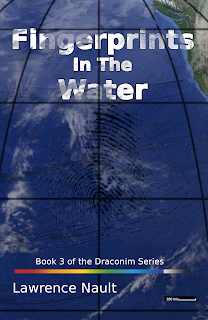
To mark the release, Lawrence has also created a narratedshort film—not a traditional book trailer, but a literary campaign-stylevideo—blending vivid narration with evocative imagery to highlight thereal-world crisis that inspired the novel. The film draws connections betweenthe fictional world of dragon-bonded teens and the very real threats facing ouroceans today.
“It began with the air... Then came the fires... And now,the water.”
— Opening lines of the video
The story centers on Kai, a Cape Breton teen whose bond withan ancient dragon reveals the true scale of humanity’s pollution—microplastics,ghost gear, chemical runoff—hiding in plain sight. But Kai isn’t alone. Agrowing network of young people, some with dragons, others with nothing butdetermination, rise together in defense of their world.
“Fingerprints In The Water is fiction, but the crisis isnot. Our oceans are choking. And those inheriting this world are no longerwaiting for permission.”
The video, premiering June 8 on YouTube, serves as bothintroduction and invocation. It’s designed for educators, students, booklovers, and eco-activists—anyone looking for a powerful story to pair with thisyear’s World Ocean Day theme: Catalyzing Action for Our Ocean and Climate.
Watch the World Ocean Day VideoPremiere Date: June 8, 2025
Title: Fingerprints In The Water –World Ocean Day Feature
Duration: ~4 minutes
Link: https://youtu.be/DrB9yhuDjYo?si=l4BN6HSQWXCNgEoq
About the Book
Part contemporary fantasy, part eco-parable, Fingerprints InThe Water is a YA novel that asks: What happens when truth can no longer beignored, and action can no longer be delayed? With poetic prose and groundedhope, the novel explores intergenerational silence, ecological grief, and theunbreakable strength of youth solidarity.
As a bonus for World Ocean Day, the book includes areal-world water testing activity—offering a gateway into W.A.V.E. 4000 (WaterAwareness Via Education), an open-source citizen science framework inspired bythe novel.
W.A.V.E. 4000: When Fiction Leads to ActionWhat began as a fictional initiative within the book hasevolved into a global, adaptable curriculum for environmental education andwater stewardship. W.A.V.E. 4000 equips students from Grades 1 to 12 to testlocal waterways for plastic pollution using age-appropriate mesh sieves (from4000 microns in Grade 1 to 333 microns in Grade 12). Each stage encourageshands-on science, civic action, and ecological empathy.
Educators, environmental groups, and youth organizations areinvited to download and adapt the W.A.V.E. 4000 framework—available freelyonline with no commercial restrictions.
W.A.V.E. 4000 Project Plan: https://fingerprints.lawrencenault.me/guides/WAVE_4000.pdf
For review copies, interviews, educational resources, orto join the W.A.V.E. 4000 movement:
Lawrence Nault
Website: https://lawrencenault.me/
Media Kit: https://lawrencenault.me/media/L_Nault_Media_kit.pdf
May 20, 2025
Summer Reading List 2025
🔥 Campfire Conversations
As the sun sets and stories come to life beneath the stars, let the books you read spark something more: connection. Each tale—from forest creature fables to interplanetary adventures and dragon-led revolutions—offers a starting point for conversations that can ignite wonder, reflection, and laughter across generations.
Pull up a log, pass the marshmallows, and dive into questions like:
Which character surprised you the most—and why?
What choice would you have made in their place?
Where did the story touch your own life?
What does it mean to stand up for something, or someone?
This summer, let reading be more than a solo journey. Let it become a shared adventure—one that spans ages, perspectives, and the space between hearts. Around the fire, with one author’s voice as your guide, discover how stories can bring families together in ways that last long after the last page is turned.
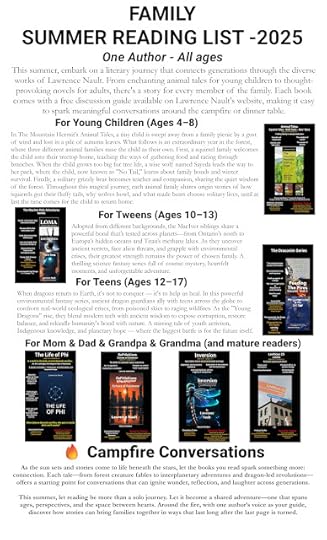
May 19, 2025
Independent vs Traditional Publishing: How to Win Without a Budget
With more than twenty years behind me as anindie author (read about that here), I can confidently say: the more things change, the more they staythe same.
Why bring this up now? Because lately there’sbeen a renewed wave of conversation about the challenges of marketing indiebooks in a publishing ecosystem still shaped—if not dominated—by traditionalmodels. Every so often, we see a localized seismic shift—like BookTok, beforemonetization restored the old order and perhaps even pushed us further back.But the broader landscape remains unchanged: we live in an attention economy,and its gatekeepers have made one thing clear—it’s pay to play.
Once, platforms offered organic reach.Content mattered. Effort could sometimes compensate for budget. But those daysare vanishing. Social platforms have entered their late-capitalism phase:squeeze creators for every drop of value, extract revenue, and wait for thenext migration wave.
For many—likely most—indie authors, money istight. Time used to be the substitute. Now, even that exchange rate isslipping. The cost of sustained self-promotion is high, and more authors arequietly—or publicly—naming what we’re all seeing: burnout, mental strain, andthe creeping sense of futility that shadows the demands of always-onlinemarketing.
 Photo by Photo By: Kaboompics.com: https://www.pexels.com/photo/person-c...
Photo by Photo By: Kaboompics.com: https://www.pexels.com/photo/person-c...Not all indie authors are in the same boat.Some have bigger boats. But even the sturdiest self-made vessels struggle towithstand the battleships piloted by the Big Five and their many-armedimprints. For those working with shoestring budgets—unable to afford even theirown paperback, scraping together social media content between other jobs—thechallenge is steep.
And to make things harder, we’re oftenundercut not by outsiders, but by our own. The indie author world is rife withinfighting and contradiction—a self-consuming ouroboros far larger and hungrierthan those found in other creative communities.
There’s an argument that publishing as anindie author must be either a hobby or a business—and if your goal is financialsuccess, then you have to treat it like a business. That may be the first realstep on the publishing journey: defining your goal as an indie author, creatinga business plan that supports that goal, and regularly revisiting and adjustingit based on your results. If you’re winging it—without a plan (and you don’tneed money to have a plan)—then maybe it is a hobby. That’s okay. Keep writing.Keep publishing. But shed the stress of sales numbers.
If you’re aiming for greater success as anindie author, what follows are some practical marketing suggestions that mighthelp. Before diving in, I highly recommend reading Amy Stewart's excellentarticle, Book Marketing for Authors: What’s Behind Door Number One. In it, Amyoutlines the kind of marketing treatment a lead title receives from a majorpublisher. I used her list as the basis for the brainstorming session thatfollows. I invite you to add your own ideas, refinements, and real-worldtactics to it.
Indie Alternatives to Traditional Publishing Advantages
What follows is and exploration of low-budget or no-budget strategies forindie authors to replicate or approximate the high-cost advantages enjoyed bytraditionally published authors.
1. Media luncheons with major news outlets
Trad Pub Advantage: Author is flown in to pitch their book toreporters, reviewers, and editors in person.
Indie Strategy:
· Create a professional digital media kit (pressrelease, sample chapters, author photo, endorsements).
· Email personalized pitches to journalists,editors, and reviewers, starting with local and regional outlets.
· Host virtual press events or roundtables forbloggers, librarians, and media.
· Offer to write guest pieces or op-eds on themesconnected to your book.
2. Bookseller dinners with key buyers
Trad Pub Advantage: Author meets booksellers and buyers at high-endevents and meals.
Indie Strategy:
· Research and contact indie bookstorespersonally; offer signed copies or digital ARCs.
· Pitch in-person events at local bookstores(readings, talks, signings).
· Join bookseller organizations or mailing listsand engage with them regularly.
· Build relationships through genuine engagement,not just pitches.
3. Sales conference presentations
Trad Pub Advantage: Author or editor pitches the book at internallaunch events.
Indie Strategy:
· Create a polished short pitch video introducingthe book and its audience appeal.
· Host a virtual launch event; invite librarians,bloggers, and readers.
· Use newsletters and partner with other authorsto spread the word through launch week features or swaps.
4. Meetings with producers of radio and television shows
Trad Pub Advantage: Publicist arranges meetings to pitch the book fornational broadcast segments.
Indie Strategy:
· Pitch yourself to local or regional radio and TVstations, especially public or community programming.
· Use services like Podchaser, MatchMaker.fm, orRadioGuestList to find podcast interview opportunities.
· Offer yourself as an expert using services likeQwoted, SourceBottle, and SourceOfSources.
· Focus on niche or topic-aligned shows where yourbook is a natural fit (e.g., climate podcasts for eco-fiction).
· Prepare a clear 2–3 sentence hook and a shortbio tailored for media use.
· Offer a downloadable press kit on your websitewith high-res images and talking points.
5. Full-page ads in major magazines and newspapers
Trad Pub Advantage: Expensive full-page advertising campaigns intop-tier print media.
Indie Strategy:
· Focus on highly targeted digitalads (e.g., BookBub, Facebook, Instagram) with modest daily spend and cleargoals.
· Pitch article ideas to magazines, journals, orblogs where your themes are a strong match—earned media can outperform paidspace.
· Reach out to regional newspapers or communitymagazines about interviews or features, especially if your story has localties.
· Design a shareable, print-quality flyer ormini-poster that readers or local businesses can display.
· Consider affordable placements in niche printnewsletters or magazines relevant to your genre or themes.
6. Massive pre-publication mailings to media outlets and influencers
Trad Pub Advantage: Publisher distributes hundreds or thousands ofadvance copies to reviewers and booksellers.
Indie Strategy:
· Create digital ARCs (PDF/ePub) and distributethem via platforms like BookFunnel, StoryOrigin, or NetGalley (budget tier).
· Build a small ARC team from early supporters,mailing list subscribers, or social media followers. (Choose your ARC readersthoughtfully. ARC reading has become the free book venue for many with littleintent to boost your book)
· Personally reach out to book bloggers andmicro-influencers for honest reviews or features.
· Offer incentives (early access, exclusivecontent) to those who agree to share or review.
· Target niche communities where word-of-mouth isstrong and expectations are more organic than polished.
7. Special author events at regional bookseller trade shows
Trad Pub Advantage: Publishers pay for authors to appear at keybookseller conferences and regional trade shows.
Indie Strategy:
· Apply to speak or attend indie-friendly bookfestivals, library association meetings, or writer conferences.
· Look for events with free or low-cost tables forindie authors (especially local fairs or nonprofit-led expos).
· Collaborate with nearby authors to co-host abooth or panel at a regional event.
· Engage with bookseller networks through socialmedia and newsletters; contribute helpful insights to become more visible.
· Offer virtual alternatives, such as a recordedmessage or online Q&A, if travel is prohibitive.
8. Major bookstore and library campaigns to get your book selectedfor their staff pick lists
Trad Pub Advantage: Publisher sends out hundreds of physical/digitaladvance copies and campaigns to secure visibility.
Indie Strategy:
· Submit your book directly to libraries throughprograms like Indie Author Project, or reach out to collection developmentlibrarians in your region.
· Offer libraries free copies (physical ordigital) and a personalized note about why their patrons would enjoy the book.
· Join local Friends of the Library groups andattend library-hosted author events.
· Contact bookstore staff individually to sharehow your book connects to their audience (especially if you’re local or yourtheme is relevant).
· Design simple, eye-catching sell sheets or rackcards and include them when you send or drop off a book.
· Cultivate relationships with staff over time,through genuine engagement and community support.
9. Payment for prime physical placement in bookstores and highvisibility on online retailer websites
Trad Pub Advantage: Publishers pay for front-table displays, endcapplacement, and premium online visibility.
Indie Strategy:
· Build relationships with local booksellers andoffer to provide standees or mini displays for free.
· Offer signed copies or donate a few books forgiveaways to generate buzz with store staff and readers.
· Ask stores if they’ll allow consignment orstaff-pick shelf placement, especially if you’re local.
· Optimize your online listings (especially onAmazon) with effective metadata, categories, and A+ content where available.
· Encourage early readers to leave reviews and usetheir feedback in marketing.
· Cross-promote with similar indie authors forshared visibility in newsletters and online.
10. A 20–30 city book tour including ticketed events at largecommunity venues
Trad Pub Advantage: Publisher funds a multi-city tour withhigh-profile events.
Indie Strategy:
· Organize a “virtual tour” by scheduling podcastinterviews, YouTube conversations, and Instagram Lives across a month.
· Coordinate a grassroots tour by targeting localvenues (libraries, indie bookstores, community centers) within drivingdistance.
· Partner with local organizations, schools, orbook clubs to co-host events with built-in audiences.
· Focus on quality over quantity: a fewwell-attended, well-promoted events can have more impact than dozens of lightlyattended ones.
· Offer hybrid options: live events that are alsostreamed to expand access and visibility.
· Document the tour with short videos or blogposts to create momentum and share highlights afterward.
11. A fully-loaded schedule of author interviews for TV, radio, toppodcasts, magazines, top websites
Trad Pub Advantage: Author is booked on a curated, high-profile mediatour with exposure to large audiences.
Indie Strategy:
· Start by identifying niche-specific podcasts,YouTube channels, and blogs that align with your book’s theme or audience.
· Build a one-sheet media pitch with your hook,short bio, sample questions, and contact info.
· Reach out to podcast hosts, bloggers, andinfluencers directly with personalized messages.
· Record short audio/video clips answeringfrequently asked questions to offer media-ready content.
· Offer to write a unique piece or give a themedinterview (e.g., “What it’s like to write climate fiction for teens”) toincrease relevance.
· Use platforms like SourceOfSources and Qwoted torespond to journalist queries.
· Aim for consistency over scale: a steady streamof targeted media features can build long-term visibility more affordably thanone-off big hits.
These suggestions arejust a starting point. No single path fits every author, but together, we canmap terrain that’s been intentionally obscured. If you’ve found your owncreative ways to stretch the indie dollar, I’d love to hear them. Let’s build
Support Independent Content CreationI know, I know, I know...
These donation messages can be intrusive. I understand that. (Trust me, I feel awkward writing them too!)
But reaching out like this is crucial. Being reader-funded gives my work something valuable that many content creators don't have: true independence.
1. Your support means I can write about what matters. I'm not chasing sponsorships or compromising my voice to please advertisers. I can pursue stories and topics I believe are important, creative, and thoughtful, regardless of their commercial appeal.
2. Your support means I don't have to chase viral trends. Instead of engineering clickbait or jumping on every passing bandwagon, I can focus on creating thoughtful content that genuinely adds value to your life.
3. Your support means this content remains freely accessible. My work stays available to everyone, including those who can't afford to contribute financially right now. Quality independent content should be accessible to all.
I understand not everyone is in a position to contribute, but if you found any value in this post you can
For the price of a coffee, you'll enable me to invest more time in creating in-depth, creative journal posts and episodes of the Stone & Signal podcast. If you'd like to contribute more, consider purchasing one of my e-books (priced at roughly two cups of coffee) – a way to support my work while gaining additional value for yourself.
Thank you for considering. Your support makes all the difference.
May 14, 2025
Stone and Signal - Episode 2: Tales That Touch The Earth
Welcome back to Stone and Signal. If you haven't heard the first episode yet you can find information on Episdoe 1 here.
The Podcast LinksThe TranscriptTales That Touch The Earth
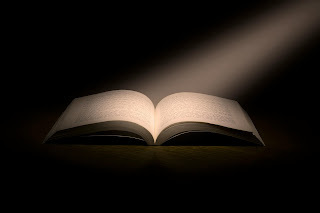 Photo by Nitin Arya: https://www.pexels.com/photo/photogra...
Photo by Nitin Arya: https://www.pexels.com/photo/photogra...I didn’t plan to write this. Like many of the stories that find me, it arrived less as an idea and more as an ache. A pressure behind the ribs. Not urgent in the way headlines are urgent, but persistent, like something just below the surface asking to be named.
In times of upheaval—personal, planetary, or both—I return to stories. Not the ones engineered to soothe or distract, but the ones that stay. Stories that don’t demand to be decoded, only lived with. The ones that surface years later in the pause before sleep, or on a quiet walk, or in a moment of grief when no facts will do.
These are not stories of escape. They are stories of return.
I believe there are some truths we can only approach sideways. Direct language fails them. Arguments flatten them. But stories—honest ones—let us circle what hurts. What haunts. What matters. They help us metabolize what the world tries to feed us too quickly.
Facts are vital, of course. They orient us. They show us where we are and what’s at stake. But they rarely show us who we are. Or what we carry. Or why we care.
That’s the work of story.
Writing now—writing in a collapsing world—feels different than it used to. There is always the question of usefulness, of relevance, of speed. Of whether art matters when so much is burning. And yet, story resists the burn. It holds a longer timeline. It whispers instead of shouts. It doesn’t try to win. It tries to connect.
The stories I write come from this space. They aren’t designed to resolve, but to reveal. Not to instruct, but to accompany. Fingerprints in the Water was born from mourning—from sitting with the quiet violence of microplastics and the grief of contaminated oceans. But it was also born from love. From awe. From the desire to hand younger readers something deeper than doom: the possibility of witness, of agency, of kinship with the Earth.
Earlier stories, like The Life of Phi, came from a different current. That book asked me to surrender certainty. To let the water speak—not as a backdrop or a resource, but as a presence. An intelligence older than judgment. There was no conclusion waiting at the end of that book, only a kind of silence. And sometimes silence is the most honest response we have.
If there is a thread through everything I write, maybe it’s this: stories are not products. They are invitations. They are vessels. Not every one will reach its reader. Not every one will be understood in the moment it’s encountered. But the ones that matter find their way. They settle in the body. They echo back when they’re needed.
And sometimes, long after the telling, something shifts. A sentence surfaces. A rhythm returns. Not with fanfare, but with familiarity. As if it had been waiting there all along.
That is the quiet work of story. To mark. To hold. To remind.
And if something in a story stays with you—if it opens something unnamed or offers a shape to your wondering—I hope you carry it gently. Not as an answer. But as a companion. A flicker of signal in the deep.
Even in the dark, that’s enough.
Stone and Signal – Episode 2: Tales That Touch The Earth - TranscriptWelcome to Stone and Signal. I’mLawrence Nault.
Today, I want to talk about stories. Not just the ones we read or write, butthe ones that hold something—the ones thatcarry land and loss and longing in their bones. The kind of stories that growlike roots through us and remind us who we are, even when everything else feelslike it’s shifting beneath our feet.
Stories are how I’ve always made sense of the world. Especially in times ofcollapse. When the ground feels uncertain—politically, ecologically,emotionally—I return to stories. I write them. I read them. And sometimes, Isit quietly and let them find me.
Why Stories Still Matter
Facts can tell us what’s happening to theplanet and the world around us. But stories?
Stories go deeper than that.
Stories help us feel it.
They aren’t just escapism. They aren’t just a respite from the busy world.
They’re emotional knowledge.
They’re how we process what the facts alone can’t hold.
“The point of a story can penetrate deeper than the point of a bullet.”
Because now, the noise is everywhere.
The urgency is relentless.
And sometimes, the hardest thing to do is feel something all the way throughwithout shutting down.
They let us linger in complexity.
They let us sit with characters who are flawed and afraid and still trying.
They remind us that we’re not alone in our ache—or our hope.
Not just stories for the sake of telling them. But stories that carrysomething.
Stories shaped like offerings.
Stories that don’t chase attention—but wait for the listener who needs them.
If the facts feel like too much—or not enough…
Maybe what you need isn’t more information.
Maybe it’s a story.
One that just lets you feel your way forward, for a little while.
That’s what this space is for.
There are studies and statistics about climatechange, biodiversity collapse, and pollution. The graphs are stark. The numbersare terrifying. We know the science—if we want to know it. But even then, thescience isn’t always easy to hold. It changes as new discoveries are made. Itasks us to understand probabilities, uncertainties, evolving models. It demandsa kind of precision that can feel distant, even disorienting.
But what moves people—what stays with them—isoften a character, a moment, an image. A single line of dialogue. A breath heldbetween hope and grief.
Storytelling is one of the oldest forms ofhuman understanding. Before there were maps, there were myths. Before data,there were tales passed from voice to voice. Stories carried knowledge. Theycarried warnings. They carried dreams. And they still do.
That’s why fiction matters. That’s why poetrymatters.
Stories let us wrap grief in language. Theylet us speak of longing without always naming it. They allow us to imagine whatcould be—while still honoring what’s already been lost.
There’s a quote of mine that’s circulated foralmost twenty years. It’s simple, but I still believe it:
That line came from a place of deepconviction. At the time, I was working on a novel that wrestled with politicalviolence and the power of narrative. And I kept seeing how story could cutthrough noise. How it could open something in people—not through argument, butthrough empathy.
And that hasn’t changed.
In many ways, it’s only become more important.
Stories can hold space for that feeling.
I think that’s part of what Stone andSignal is about, too.
So if the world feels too loud to understandright now…
One that doesn’t demand you believe anything.
And that’s why I keep telling stories.
My Own Stories: Dragons, Youth, and the Earth
In my own writing, I’ve tried to createstories that carry the weight of the world—but still leave space for light.
In Rephlexions, the world is quietlyinfiltrated by an AI system designed by a single organization. On the surface,everything seems seamless. But beneath it, control is tightening. Yet even inthat world, there’s space—in nature, in analogue art, in the resistance thatbegins not with violence, but with imagination.
In Inversion, the Earth is transformedby a climate shift no one saw coming. Volcanoes erupt, ice swallows the planet,and ancient worlds begin to surface. But even there—within the upheaval—thereis space. For family. For quiet. For love.
In my Draconim series, I follow a groupof teens bonded to ancient dragons—not through magic, but through sharedpurpose. Each teen is connected to an environmental crisis: air pollution,water contamination, forest fires, habitat loss. They aren’t superheroes.They’re just young people who care too much to stay quiet—and who find eachother, slowly, across distance and difference.
Their dragons are old—not mystical, notall-powerful, but wise. Rooted.
The bond is emotional. Spiritual. Intergenerational.
A passing of the torch.
It’s memory.
It’s protest.
It’s prayer.
And loss.
I had Amy’s hands, carving the driftwood.
I had Kai, standing at the shoreline, watching waves that no longer seemedinnocent.
There’s a moment in the third book, Fingerprintsin the Water, where Kai—the teen connected to the ocean—watches hisgirlfriend, Amy, carve a piece of driftwood. She shapes it into a version ofTurtle Island, surrounded by dragons and ocean creatures. It’s not just art.
It holds grief. And hope.
That scene came out of a real ache. I’d justread a news article about whales washing up with stomachs full of garbage. I’dbeen listening to youth climate leaders speak with more courage than mostpoliticians. And I wanted readers to feel that—not through statistics,but through story.
I remember writing that chapter after readingabout microplastics being found in human blood—and brain tissue. I felt thatsick, sinking pressure in my chest—the kind you don’t have words for. But I hadcharacters.
Fiction let me speak what I couldn’t explain.What might not be heard—if it wasn’t told in a story.
And I’ve learned that when I write from thatplace—not from a plan, but from that ache—readers feel it too.
The Power of Story in the Age of Collapse
There are days I wonder why I keep writing.
The world feels like it’s unraveling. Thesystems we once trusted—governments, institutions, technologies—are showingtheir cracks. The climate is no longer whispering in subtle signs. It’sshouting. Flooding. Burning. Shaking us awake in the middle of the night.
And still, we scroll.
My words often feel lost in an abyss ofthought and commentary, swallowed by the churn of constant content. The speedof the world makes it hard to be heard unless you shout—or entertain. And I’venever been good at either.
In an ocean of books and podcasts and voices,mine feel like the strange, luminous creatures of the deep—rarely seen,surfacing only when caught by accident in a trawler’s net, or glimpsed by thelights of a passing submersible. Down there, I believe they shine. Quietly.Patiently. But in a culture built on speed and visibility, few dive that deep.
And yet, I still return to the blank page.
To the mic.
To the story that hasn’t yet taken shape, but insists on being told.
Not because I believe it will change the world overnight.
But because some things need to be said anyway.
Signals sent forward.
Shelters for the truths we’re not yet ready to face.
One line that stays with a reader for years.
One imagined world that helps someone survive this one.
And people, slowly, change the world.
Especially now.
But because I’ve seen what happens when a story meets someone exactly wherethey are—and helps them keep going, just a little longer.
That’s everything.
Water, who was here long before us—and will be here long after.
Water, who remembers everything and judges nothing.
Water, who observes—not with detachment, but with permanence.
To the voice of water.
Not because I think it will go viral.
Because stories aren’t just for now. They’refor what comes next.
They’re messages in bottles.
A story can land in someone’s life years afterit was written—quietly, without ceremony—and still move something. Still open adoor. Still carry a little light into a dark room.
I write because I still believe we can change.That we must change. That young people can lead us. That grief, when givenform, can become action.
And I know I’m not alone.
There are so many writers and artists andcreators doing this work quietly, without platform or spotlight—planting seedsin their stories, trusting they will gr ow in unseen places. You might neverknow the names of some of them. You might never see their work shelved in astore. But their words matter.
Sometimes, one sentence is all it takes.
Books change people.
Even now.
So I keep writing.
Not because I always know how, or feel braveenough, or think it’s working.
That’s enough.
Reflection & Invitation
In The Life of Phi, I did somethingdifferent.
I gave the story another voice—an observer.Not a character. Not a narrator. But something older. Something quieter.Something elemental.
Water.
The story is set in a near-future world wherean AI—designed to heal the environment—has been released because humanity couldnot change course on its own. Our species kept marching down the road ofenvironmental manipulation and destruction, even as the signs grew impossibleto ignore.
And in this world, the biases of oursocieties—so often buried in data, in power, in policy—are made visible throughthe lens of the AI itself. What it protects. What it sacrifices. Who it deemsessential. Who it does not.
Religion, too, has shifted. In many places, itno longer guides belief—it governs it. It becomes a tool of control, not avessel of faith.
And through it all… there is water.
Water, who has no side.
In The Life of Phi, water speaks at thebeginning of every chapter. Its voice takes the form of poetry. A rhythm thatflows beside the narrative, reminding us that while humans are busy trying tocontrol everything, something vaster has always been watching.
I’d like to take a moment now to listen tothat voice.
I invite you to listen with me.
I am the first memory of Earth,
Born in the violent birth of worlds,
When cosmic dust danced with stellar fire
And gravity drew me from the void.
I have been ocean, cloud, and ice,
Flowed through the veins of dinosaurs,
Frosted the wings of ancient dragonflies,
And nestled in the wombs of early mammals.
I remember when I was mountain snow,
And when I was morning dew on the first flower.
I have been tears of joy and sorrow,
Blood in warriors, milk in mothers.
You look at rivers and see separation—
This bank, that bank, here and there.
But beneath the surface, I am one flow,
Moving, merging, always whole.
I have been male sweat and female tears,
Coursed through bodies of all designs,
Been part of those who fit no mold,
And those who transformed like me.
In deserts, I am precious gold.
In floods, I am feared destruction.
In life, I am eternal change,
Shifting forms but never essence.
I have flowed through hearts that love differently,
Through minds that think in varied hues,
Through bodies shaped by nature's artistry—
Each vessel unique, yet each containing me.
You see the surface tension that divides,
The ripples that make patterns strange.
But I have been every kind of water
That has ever been or will be.
I have tasted every difference,
Moved through every form of life,
And let me share this ancient truth:
It is the mixing that makes us strong.
Like tributaries joining the sea,
Like rain returning to the source,
We are all the same water,
Flowing in different streams.
Remember me, for I remember all—
Every shape that held my essence,
Every form that gave me purpose,
Every difference that made me whole.
Let the voice of water sit with you, if it speaks. Or if it simply flowspast, that’s okay too.
It will be here—watching, listening, waiting—long after we’re gone.
Until next time, may your signal find the stones that hold it.
Thank you for listening.
If this resonated with you,stay. Listen to it again. Share it with a friend. Come back again when you areready.
If you'd like to support this work, the best way is throughmy books—available wherever you buy yours. They're how I fund the quiet time ittakes to make something like this.
My essays and poems you can findon my blog at lawrencenault.me.Just click on ‘Journal’.
Transcripts and reflections arelive on my blog.
Thank you for listening.



